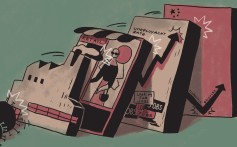
South China Morning Post
China’s central bank has warned the international community to be alert to the risk of a “Great Depression” in the wake of the Covid-19 outbreak, although it said the chances of this occurring was low.
“The possibility of a ‘Great Depression’ cannot be ruled out if the epidemic continues to run out of control, and the deterioration of the real economy is compounded by an eruption of financial risks,” Zhu Jun, director of the international department of the People's Bank of China, was quoted by local media as saying last week.
The difficult trade-off between the need to protect public health and the economic cost of shutting almost all face-to-face human activity has prompted warnings from many economists that the economic shock from Covid-19 may be more severe than the 2008 global financial crisis or even the Great Depression.
The latter, which began with the Wall Street Crash of 1929, saw credit markets freezing up, massive bankruptcies, US GDP falling by more than 10 per cent and unemployment rates that touched 25 per cent.
Professor Terence Chong Tai-leung from the department of economics at the Chinese University in Hong Kong, said he was optimistic the global contraction would not be as severe as the 1930s slump.
“Governments are likely to decide to ease off restrictions by July. They need to prevent disruptions that would cause food shortages, social unrest or greater damage to human lives and the economy than if the restrictions continued,” Chong said. “The economy will naturally rebound when restrictions are lifted.”
But there is evidence the major toll this crisis is already having a massive impact on the US employment situation. US initial jobless claims of 6.65 million last week, up from 3.3 million the week previous week, highlighted fears of mass unemployment
Currently global markets are already down 35 per cent, credit markets have seized up to 2008 levels. Even mainstream financial firms such as Goldman Sachs, JP Morgan and Morgan Stanley expect US GDP to fall by an annualised rate of 6 per cent in the first quarter, and by 24 per cent to 30 per cent in the second.
Moody’s has warned that 30 per cent of US home loans may stop being serviced as a result of job losses and a lack of support for small businesses.
Zhu from the Chinese central bank said the biggest market uncertainty came from the fact that central banks’ swift and forceful actions could not directly help to control the epidemic but stopping its spread would help market confidence.
He said the policies of advanced economies had helped stabilise stock market sentiment but hidden risks continued to exist in the global financial system.
For example, stock markets in developed countries have been rising for many years so their valuations are under pressure.
If the market panics due to the intensifying impact of the epidemic, that could lead to tighter market liquidity, triggering market contagion across different asset classes.
The corporate sector, which has a relatively high level of debt, could also see an increase of defaults on banks’ non-performing assets and corporate bonds.
Nouriel Roubini, professor of economics at New York University's Stern School of Business, said the public-health response in advanced economies has fallen far short of what is needed to contain the pandemic and so the risk of a “greater depression” was rising by the day.
He warned that if a series of virus-related negative supply shocks reduced potential growth, the fiscal response of many countries could hit a wall as they would not be able to borrow enough in their own currency.
“After the 2008 crash, a forceful (though delayed) response pulled the global economy back from the abyss. We may not be so lucky this time,” Roubini said. “Who will bail out governments, corporations, banks and households in emerging markets?”
Despite a US$349 billion government backstop, US banks are refusing to lend to struggling small businesses at 0.5 per cent, and choosing to make the loans at 1.0 per cent instead.
Michael Every, global strategist at Rabobank said, in reality these financial packages can be hard to access, and may not be really effective.
“That is a Great Depression happening in the blink of an eye,” Every said. “Who knows where the damage will spread to, and when, if we are going to see 25 per cent unemployment across much of the developed world for an extended period?”


